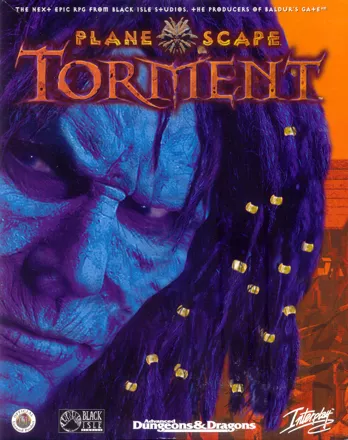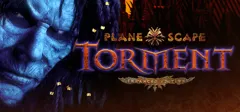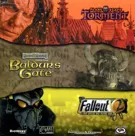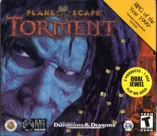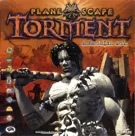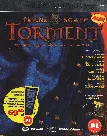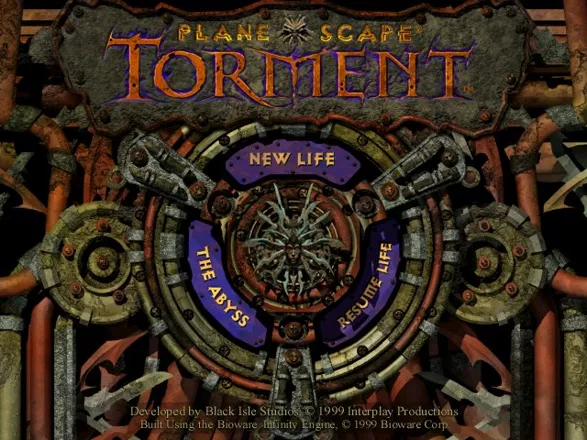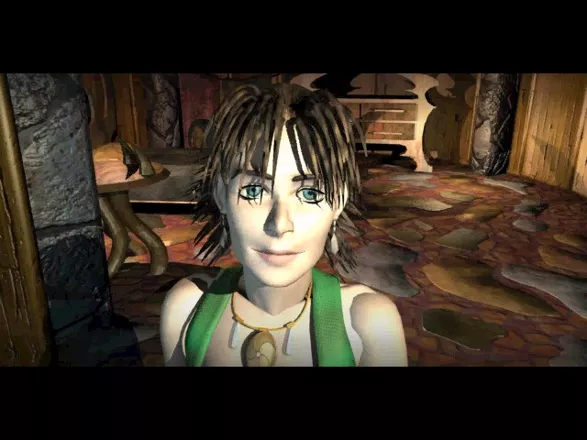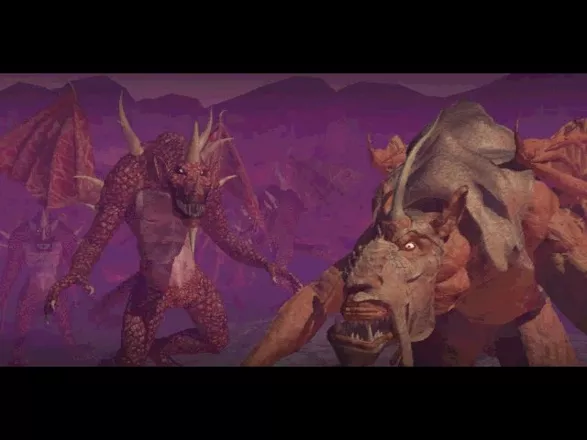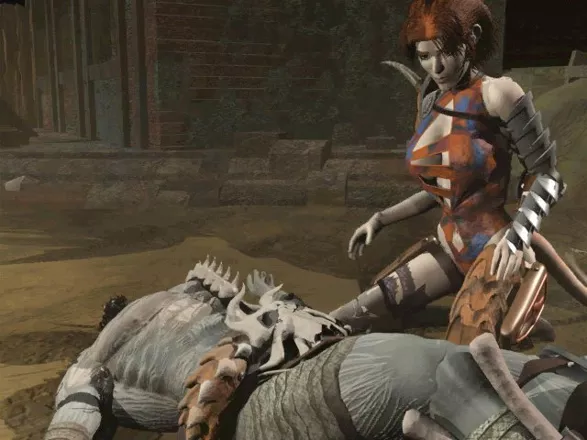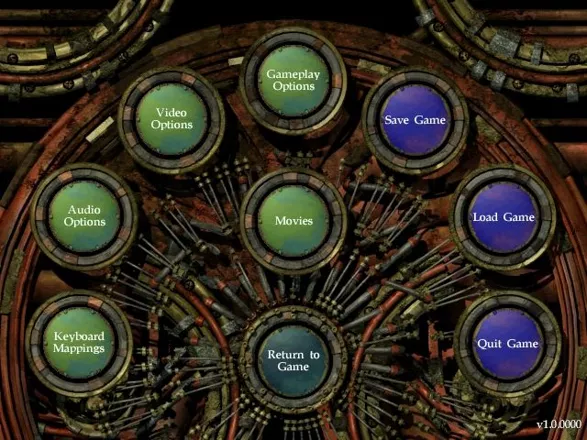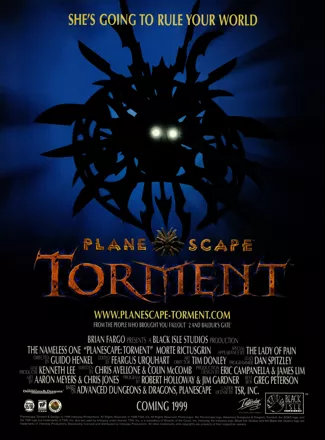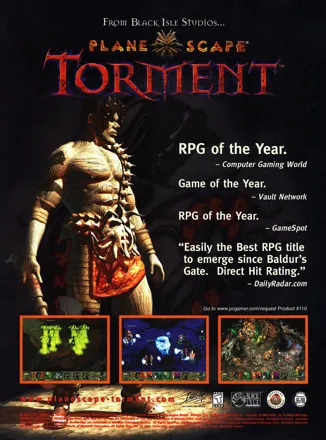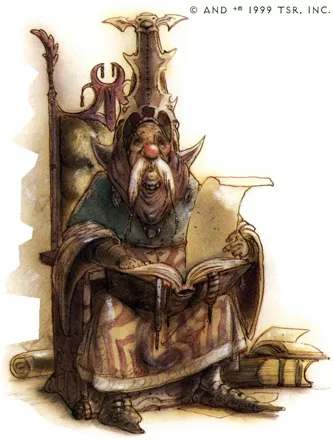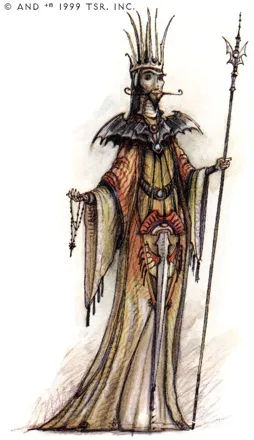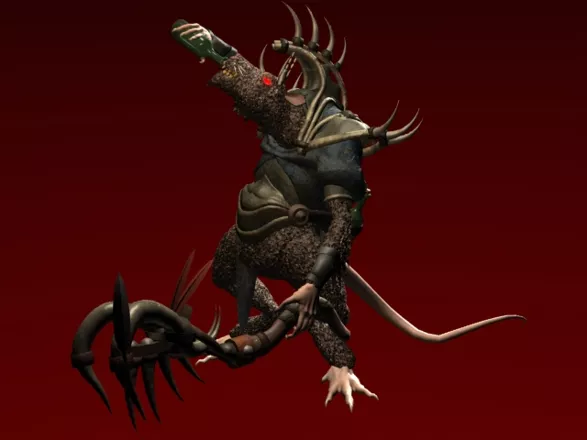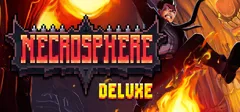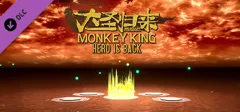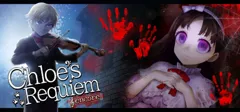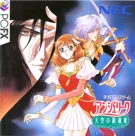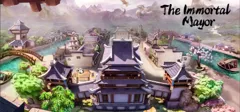Planescape: Torment
Description official descriptions
Waking up on a stone slab in a morgue, which the zombie workers just pushed into the room, a big man with a face deformed by scars, his back marked by strange tattoos, looks at the dead bodies scattered around the room through the dim light, unable to understand who he is. He is sure that he is dead, yet he is also sure that he moves, thinks, and feels. Memories of love, a woman's face, good and bad deeds of his life - all his past appears in a flash, only to be replaced by the dreadful reality of the mortuary.
His journey begins with only one goal: he must learn his name, find out what had happened to him, and which forces prevent him from dying in peace, like all other human beings. The Nameless One opens the doors of the mortuary, only to dive into a world full of fateful encounters, strange characters, broken hopes, despair, and hatred. Piece by piece he shall solve the puzzle and re-discover his own past.
Planescape: Torment is a role-playing game that uses a heavily altered variation of the Advanced Dungeons & Dragons Second Edition rules. It is set in the Planescape, the exotic AD&D setting which is composed out of various "planes" of existence, with unique characteristics to each. The game features the party-based, "real-time-with-pause" combat system which was previously employed in Baldur's Gate.
Character growth is handled via the standard AD&D attributes, which can be raised and modified in the game. Abilities that are not exclusive to combat, such as Intelligence, Wisdom, and Charisma, play a special role in the development and outcome of many of the game's conversations and quests. Dialogue options may become available only if the corresponding character parameter is sufficiently high. The outcome of the final quest and thus the ending of the entire game also depend on the way the player has been shaping The Nameless One during the journey.
Various fairly exotic characters - including a talking floating skull and a winged succubus who runs a "spiritual" brothel - will join the hero on his quest. These characters belong to the traditional AD&D classes of fighter, mage, thief, and cleric. The Nameless One himself starts as a fighter but is able to become a mage or a thief if he meets certain requirements and completes certain quests. The hero is unable to wear armor but can enhance his defenses with special tattoos.
Though combat occupies a significant portion of the game, much of it is dedicated to acquiring experience through exploration of the Sigil, the game's main "hub" town, and performing quests for its inhabitants. The game is notable for containing a very large amount of in-game text and conversation.
Spellings
- 异域镇魂曲 - Simplified Chinese spelling
- 異域鎮魂曲 - Traditional Chinese spelling
Groups +
- Dungeons & Dragons (D&D / AD&D) licensees
- Fantasy creatures: Succubi or incubi
- Game Engine: Infinity Engine
- Gameplay feature: Character development - Skill distribution
- Gameplay feature: Journal
- Gameplay feature: Pickpocketing
- Games made into books
- Physical Bonus Content: Poster
- Theme: Amnesia
- Torment series
- White Label releases
Screenshots
Promos
Videos
Add Trailer or Gameplay Video +1 point
See any errors or missing info for this game?
You can submit a correction, contribute trivia, add to a game group, add a related site or alternate title.
Credits (Windows version)
143 People (137 developers, 6 thanks) · View all
| Lead Programmer | |
| Programmers | |
| Additional Programming | |
| Scripters | |
| Movie Technology | |
| Lead Artist | |
| Artists | |
| Additional Art | |
| Lead Designer | |
| Designers | |
| [ full credits ] | |
Reviews
Critics
Average score: 89% (based on 61 ratings)
Players
Average score: 4.2 out of 5 (based on 372 ratings with 20 reviews)
The Good
Never before have I stumbled upon any similar game to this one. This one is strong enough to define a new dimension of adventure and role-playing genre by itself, as it borders with so many similarities to as-we-know-them isometric hack & slash RPGs (by simply being played throughout such a viewport), and with royal 3rd-person point and click adventure genre (as it has more dialogues than in any pure adventure genre I know, more text that in some pure text-only adventure, too). So what's so special about this game in general and why is it worthy spending couple of months playing it (and that's bare minimum you'll need of your time), let's see...
You're playing a big, muscled character, who simply cannot remember his name. Awaking in the mortuary, on a slab pushed here by some mindless zombie drone, you find your only help to be a babbling skull, Morte's the name. For some strange reason you yet need to discover, you are immortal (at least in general), and your wounds heal very quickly. However, your body does look like you've pased through some serious series of battles and got skewered and hacked quite a lot. Yet another thing is making you a drawback in this game, your memory. You've seen to lost it. As a matter of fact, you seem to lost a part of it every time you die. So, that's all you find out from the story epilogue, but it gets more and more complicated as you progress, with a series of sub-stories aside as well.
A typical mark of an RPG is a character skill level upgrading system. Well, here you have all the needed, charisma, which improves your look and help you when talking to strangers, or at least they're more pleasant. Wisdom, which helps you regain your memory faster, and makes you smarter, or should I say, wiser, so you get more options in dialogues with everyone. Intelligence whih can be good if you decide to orient your character into a mage. Dexterity which comes in handy for thief's hands, raw strength for a warrior class, and so on. Or, you can try making a ballance of them all, and have good part of all, but none to be the best.
Dialogues are really enlarged and I bet the script for this game was at least twice the size of some encyclopedia, but the fact is that the text isn't just babbling in the wind, it actually makes sense, all of it (well, most of it), and is funny, sad, annoying, ordinarily, and basically resembles the situation of the game to fit it in its own style. Battle system is also nicely done, especially when you have to control all six of your characters, it work efficient, more or less. Dunno if it could be done any better (except for the speed). Music is very nice to listen in the background, but isn't the stronger side of the game, especially since it's rare and you won't remember hearing more than just a couple of different songs throughout the whole game, even though your music directory on your hard will tell you otherwise.
I dunno what's happening nowadays, either we're getting too much or horror games out there, or is the graphic just getting better? Anyway, I don't think some "Ghost 'n' Goblins" or "Castlevania" or even "Alone in the Dark" could scare anyone, but today's games, hehe, man, that works even too good. Must've been the graphic and the bigger power our machines can achieve. Well, the thing I mention these is not because this game's a horror, it's most certainly not! But comes to think of it, if all those things you'll encounter by playing this game, and all things that'll be described or heard in the dialogues would be done a bit better visually, or at all, "Phantasmagoria" would seem like a child's toy comparing to the level of yuckness this game could achieve. Why am I saying this under the 'good' section? Well, because you won't get a feeling you're in some gruesome place at all, hehe, it's all so well made to show such nonesense not a bit. It really sticks to story instead of the atmosphere, and they achieved that quite wonderful, I must say.
The Bad
So, is there anything bad about this game? Well of course there is, and no, don't just tell me "every game has bad things", because that doesn't have to be true in every case, and every player can count at least two games that have no flaws in his/her eyes.
I) All dialogues (99,99999% of them) is not done by voice-acting at all, which begs to ask, why employing such a known people for voice-acting when there's barely something you may hear. Only speech you hear is when you try to take someone's armour or a weapon off, or the first sentence in their dialogue with you. And yet, game is on 4CDs, but this really looks terrible. I mean, once you hear them talking, and next 100 paragraphs you must read yourself, and not to mention there are as many descriptive talks as actual parts of conversation. I mean, Sierra did make their "Phantasmagoria" in 16 colors only just because the FMV took 7CDs, but if they removed speech, they'd at least spare one more CD on that game, too.
II) Game that comes on 4CDs and barely has any animations and speech is doing something wrong. Even though game has so many paths you can finish it, play it, and do certain things in it, should fit on one or two CDs. And as much as it may seem big, it is not. That small map you see at the start is the entire territory of the game, and all those planes that are mentioned in the game are just a few you will be, and can be at. The game is smaller in places than "Revenant" or maybe even "Nox", which both come on a single CD only, and yet both of them have more animations than this one. Not to mention fully speech. And they're all made pretty at close distance to each other, so comparing can be allowed and fair.
III) This game is dragging its butt like a wild boar who was shot with a sleeping injection. It's so slow that it's intolerable. As soon as some magic is used, or more enemies comes to the screen, it almost looks as it'll crash. The fact that this game is released three years ago, and that I was playing it on 1GHz processor with 384MB of RAM is very bad to accept. I mean, back in 1999 even best computers weren't this strong, so for who did they make that game? Or maybe they made it be equally slow on 30GHz CPU or some old 486 just as well.
IV) The entire sound and music quantity in this game is terrible. Of course, this is all shadowed by the story, but it's terrible if you focus on that thing, only. Also, if you battle, and the music is fast and furious, and then you go talking to someone, you may end up talking for half an hour, while having same annoying fast attacking song in the background. Sometimes, my only choice is to switch to some radio station until I'm through reading some dialogue. Man, how would it only be if this game WOULD have speech ;)
V) The game is too filled with bugs, as if they rushed its release before some serious must-testing. Since game constantly fills its 'temp' directory with infos about all the rooms and places you were onto, it may slow down every now and then, and that happens rather too often to neglect. Or sometimes you may just end up wihtout seeing your mouse cursor or selection lines and windowses.
I could say a few more annoyances, but I could also say a few more good things about this game, and I'm bordered with the size of this post, so this should suffice as general pointer.
The Bottom Line
This is one of those games that manages to fascinate you with its creativity level to being unbelievably good. However, no matter how much you may like it, it also gives you an open view to all of its downfalls, so you can either choose to neglect them, and keep being angry inside yourself, or you can shift your opinion about this game all the time, going from "whow, what a treasure" to "ah crap, is there anything good about this game". The thing is, that no matter how deep this story may seem at first, second or ever at fourthyfifth attempt, it is a cover for a simple story in which your main nemesis is your own life, nothing we didn't see in many other games before it, but the fact is that this game separated your life from you, so it can be shown as a physical battle, not just a battle of good and evil inside someone's mind and body.
Unless you're determined to finish this game without any subquests, and do the only things you must to finish it, you'll need couple more months for it, and being on four CDs should speak for itself about the game's length, especially since there's not much of a voice-acting in it, all text, vast army of letters. It has quite a balance of story, adventuring, strategy and action, but how well is the game balanced between thee, it's up for everyone to decide on their own. Truth is that I enjoyed immensely at some part of this game, considering it the best game ever... but then I got over it, as soon as it showed me how annoying it can be sometimes, and patience was never my virtue, unfortunately. But then again, it's hard not to like a game which gives you so many questions, is it not? ;) Find out for yourself, I can't say anything that would attract or repel you to this game. It's great, buy it. It's a crap, toss it away if you get it as a present. Nope, nothing solid like this can I offer you, nothing but to say, 'try it'.
Windows · by MAT (240793) · 2012
I don't think we're in Faerûn anymore, Morte ...
The Good
Amnesia in today's role-playing games has become little more than an over-used cliché to create blank characters on which players can project whichever personality they wish, but which nonetheless have a past that's relevant to quests and NPCs. Off of the top of my head I can name only two RPGs in which the cliché works as a plot element, one being Knights of the Old Republic, the other Planescape: Torment.
Planescape's major feat is combining the time-honoured AD&D rules with a setting and characters that are amazingly original and deep. Players are presented with a world that appears to the main character as alien as it must have appeared to lovers of classic high fantasy when they first opened the Dungeons & Dragons Planescape campaign box.
Waking up on a slab in a gigantic mortuary, players are hit with some rather surprising facts about their existence: one, they were dead; two, they can't be too sure whether or not they still are; three, their memories of what brought them there are gone and four, apparently somewhere along the way they befriended a floating skull who pleasurably gives the hero what little information he is to be provided with to start his quest. The macabre miracles don't stop there because not only must the walking corpse flee the mortuary run by a slightly disconcerting group of people nourishing a philosophical death wish, upon stepping out into the streets the nameless hero, appropriately named Nameless One for the entire game, discovers that he is in Sigil, the City of Doors and easily the most unusual place in the entire AD&D multiverse. Being the hub of a cosmological wheel on which all possible worlds in the Advanced Dungeons & Dragons universe are located in the form of dimensional planes, Sigil appears to possess the inherent trait of randomly opening magical doors to said worlds and attracting its inhabitants. The potential for literally outlandish characters which bring a plethora of personalities, backgrounds and quests to Torment's rich story is nigh unlimited and used to almost full effect by the creators.
Everyday little wonders can be found at every corner and its a credit to the game's sheer narrative power that the vast majority of odd episodes play out almost entirely as text box descriptions. Dialogue in Torment is elaborate and incredibly well-written; at the time of its release it easily beat the until then wordiest RPG, Baldur's Gate. The game's strong focus on personalities and intellectual problems very elegantly steps in the way of this becoming a chore. Battles play an inferior role in Torment and can often be evaded altogether using the game's equally developed and elaborate dialogue options. In short: Planescape is one of the wordiest games ever, waking memories of old Infocom text adventures which captivated gamers' imaginations like good fantasy novels do. Torment achieves exactly that.
Torment's main cast is one of the strongest and most colourful in any RPG created to date. Whoever thought Final Fantasy holds the monopoly on quirky and unusual party members needs to play this game. Where else does an undead hero team up with the already mention floating, Billingsgate-talking skull who equips dentures like weapons, a half-demon street thief, an honour-bound mystical warrior, a succubus and ex-proprietor of a platonic brothel, a robot looking like a walking TV set, an eternally burning arsonist wizard or an animated suit of armour?
Based on the Infinity Engine already used in the Baldur's Gate and Icewind Dale series, Torment's graphics are presented in Black Isle's standard isometric view. Running at a resolution of 640x480, the game's detail level benefits from larger onscreen sprites and a closer look at the morbid scenarios. Thanks to a freely placeable actions menu that can be displayed and hidden with a right-click, the screen layout feels a little less cramped than in Baldur's Gate and allows for a literally broader view of the world.
Torment's music is appropriately odd, mixing minimalist and experimental tunes with mysterious melodies just unusual enough to never let players forget that while they're still playing a fantasy game, a classic AD&D campaign this ain't!
The Bad
For players with the right mindset Torment is an almost perfect RPG experience and its shortcomings are mostly matters of personal taste.
Unfortunately, its greatest asset, the captivating text descriptions and dialogue, make the game inaccessible for casual gamers or those who don't feel like wrapping their minds around an exceedingly fantastic and macabre world. The game decidedly (and rightly!) closes the door in the face of people who are unwilling to read the equivalent of a fully-fledged fantasy novel onscreen.
The graphics, while bigger and clearer than in other Baldur's Gate-related titles, restrict a larger view of the scenarios by limiting the game to a single resolution, 640x480 - pretty low by today's standards, considering that unlike Baldur's Gate even the action panel to control characters can be freely moved and hidden when desired. In addition, character models, although detailed and well animated, are static in terms of design. Almost no equippable item changes anything about the models onscreen appearance.
AD&D fans will also miss the possibility of building a custom party of adventurers. As versatile as Torment is in terms of scenario, it is far more linear than most other AD&D game when it comes to character development and customisation. Only the main hero can equip different weapon classes based on his chosen profession and it isn't possible to choose from all professions the AD&D rules have to offer. The Nameless One can be either a fighter, wizard or thief, but always looks like a buff warrior type even if his stats and chosen profession say otherwise.
Exploring Sigil and its inhabitants is one of the greatest joys I've ever had in an RPG. It is almost a pity that after three fourths of the game players are ripped out of the by then familiar surroundings. While the game builds to a climax they are forced to travel to other, significantly smaller and more linear planar worlds.
The Bottom Line
Planescape: Torment is one of the most unusual, original and rewarding RPG experiences to date. It requires and tries players' patience and imagination but repays them many times over if they are up to the task. The game exists and entertains through its deep and lyrical understructure, making its lack of character customisation excusable.
All seasoned gamers looking for a fantasy tale far, far away from the genre's stereotypical elves, dwarfs and humans vs. orcs stories must play this game.
Windows · by Kit Simmons (249) · 2008
The intellectual's rare delight, the gamer's pleasant surprise
The Good
The science fiction and fantasy genres are unfortunate, because they tend to attract mostly second-, third- and lower rate artists who populate it with their mediocre work. There is, however, a great redeeming feature: these genres allow gifted creators to tell a story that simply could not be told outside of the genre realm. And such is the story of Torment.
A video game like no other, Torment (I will refer to it only as Torment, because that seems to be its real name; after all, we do not call it 'Forgotten Realms: Baldur's Gate', do we?) tells a tale of a man who can not die. Somewhere, somehow, he lost his mortality and with it, apparently, his memory and even his name. All he has is a vague feeling of emptiness and sorrow. His quest is obvious: try to find out what happened to him and, eventually, die.
All RPG heroes search their world trying to become someone. The Nameless One's journey goes exactly in the opposite direction – he desperately struggles to become no-one. This alone makes Torment unique. But there is more to the game than just an inventive storyline.
The setting of the game suits the story and its themes perfectly. Planescape is just what its name implies, a series of worlds, planes of existence, each with their own attributes, and most of the game takes place in the city of Sigil in the centre of all planes. It is a crossroads, a place of many doors and a cage, all at once. Everything eventually appears in Sigil. It is, also, a city that for the same reason serves as a net in which all the scum of the planes tends to catch. The game's world is dirty, the game's world is crude and brutal. There is no elegant sword-fighting to be seen in Torment, there are only maces, heavy axes and stilettos. Forget potions that restore health, be prepared to use a needle and thread to stitch your wounds and wrap yourself with bandages, dirtied with age and use. You start the game on a slab in a mortuary, surrounded by dead bodies in various stages of autopsy, zombies and a floating, talking skull, who will become your first party member.
Party members in Torment are one of the greatest things this game has to offer. There are relatively few of them (nowhere near Baldur's Gate standards), but they are easily the best written, most complex and most memorable characters I have ever seen in any video game. Each and every one of them has his or her own reason to follow you, a reason they may not necessarily share with you when you first meet. Each one of them is psychically broken in some way, each of them is a tormented soul. They have their own peculiarities, they react to your quest and to each other, their and your fates are intertwined. You can (and should!) talk to them and who knows, perhaps you can even help them solve their own problems while solving yours. They are a strange group of eternal losers, but the emotional attachment you build up for them during the game is unusually strong.
So many superlatives and yet I still have not mentioned the single best thing about Torment. The Final Fantasy series (especially FF VI, FF VII and my favourite FF VIII) has shown us that a video game may engage the player emotionally. Torment shows that it may engage the player intellectually as well. The game is well known for unprecedented amounts of written text, pages and pages and pages of interactive dialogues with innumerable branches. This is a game for people who like to read, and surprisingly enough, not only is there a lot to read, but the writing quality is exceptionally good. The writers have a taste for very short stories and tales, and you will come across many of such stories in Torment, told by people on the street and in bars. Some of them may be tangential to the plot, some of them crucial, some of them are crucial but at the time you read them, you won't realize it. Some of them are about your companions, some about the person you were. All of them are well written, some I would even call concise masterpieces. All the major characters also have a distinctive voice, their own peculiar use of language and methods of expression. I think that if you took a random line spoken by any of the major characters out of context, the speaker would still be clearly identifiable. And the greatness of Torment lies in the fact that under all this extraordinary writing, there is a soul and a real intellectual depth.
We have seen many amnesiacs and their quests for identity in video games, but in Torment, the amnesia is used in a radically different way than in, say, Sanitarium. In other such games, the goal is to find out who you are. In Torment, the question of who you are is irrelevant - who you are is defined by your actions. You are trying to find out who you were. This is not just playing with words; your past keeps catching up on you in the Planes, you always run into people, demons and spirits who had known you before, who had talked to you, who had loved you, who had wanted to kill you, who had been betrayed by you, who had died because of you. That is the Torment of the title: The Nameless One is crushed by the weight of his previous lives and by his ignorance of all their deeds, good or evil. The game repeatedly asks its famous question, 'what can change the nature of a man?', and I would like to stress that this is not just showing off, giving a fast food philosophy to the hungry masses (anyone remembers the Matrix film series?), the question, the most important question in the whole story, actually forces you to think. The game deals with highly abstract concepts on almost every step. You can even join various factions in the game, if your vision of the world harmonizes with their beliefs! Do you believe the meaning of life is experiencing the world as much as you can? Join the Sensates. Do you think you are in this existence only waiting for your True Death? Join the Dustmen. Do you believe that order and lawfulness restrict your freedom? Join the Anarchists, or, actually, don't, just kill a lot of people and annoy everyone you meet, because a faction of anarchists is something of an oxymoron, isn't it? The Nameless One has an AD&D alignment, but it is not chosen on the character generation screen - because that does not really make sense, does it? Your actions choose your alignment, not the other way around.
But wait - did I mention the game is actually a lot of fun to play? Did I mention that your party members every now and then lead hilarious conversations with each other (I admit the endless Annah-Morte bickering wears thin after a while, but Nordom's bewildered observations of the world around him are pure comedy gold)? Did I mention that this is not only a game where you can stumble upon a playful Franz Kafka reference, but also a game in which you can buy a harlot's services for your floating skull friend and spend some time wondering what exactly are you paying for? Did I mention there is a randomly generated dungeon in Torment that is actually a very gentle parody of randomly generated dungeons, for the hardcore gamers in the audience to enjoy? The game is not a dry intellectual debate, the game of course knows that its main purpose is to entertain, and it entertains. There are many levels on which you can enjoy the story of The Nameless One.
There is only a handful of games that have made me cry. Torment is one of them. The game is highly original, extraordinarily clever and utterly fantastic in many, many ways. The whole dramatic finale, with its wonderfully simple and soothing music and unbearably beautiful sadness, is one of the most memorable and powerful scenes in gaming history.
Torment is a rare gem, a piece of true art in a field overgrown with weeds.
The Bad
First I would like to say that no matter how long this section is, I still consider Torment one of the greatest games ever created. What I would like to do in this section is to point out that this greatness completely overshadows a rather large mistake made by its creators - an unfortunate choice of game engine.
From one perspective, the choice makes perfect sense: the Planescape setting is a licensed AD&D setting and the game is played by AD&D rules. What the makers did, therefore, was reach out for the engine that powered the successful Baldur's Gate, another AD&D license. Just a few tweaks were needed and the engine was ready - allowing, probably, more time to spend on art and writing. The problem is that the gameplay of Baldur's Gate and of Torment is vastly different.
Let's face it: Baldur's Gate was about combat. You kill some things, level up, find a clue, move on. I'm not saying I didn't enjoy Baldur's Gate (I did), but it is clear the game focuses on fighting. Torment, on the other hand, focuses on dialogue. There are fights in Torment, and they are fun, too, but they are of secondary importance - as they have to be, obviously, when your main character can't die. What is the point in fighting an immortal? What is the point of fighting if you are an immortal? Yes, these are precisely the kinds of questions Torment likes to ask, but it still means the choice of game engine is very peculiar. Killing beasts to level up in Torment is a complete waste of time. I haven't counted, but I think that throughout the whole game, you get much more experience by talking to everyone you meet and choosing wisely in dialogues than by slaying everything you see. And, to be perfectly honest, experience and levels are actually quite unimportant in the game. You level up - so what. You're not there to kill an evil wizard and save the world. You're there to kill yourself. There are some very cool high level spells with special animations and FMV and all that, but by the time you are at a high enough level to use them, there is no one to use them against, so why bother, really?
Also, as an RPG game, it has serious balance issues. The game is pretty much designed to be played with a mage character who is good to people. Mages get the best items and the best dialogue options; Dak'kon, the mysterious and silent warrior, becomes a really interesting companion only if you are a mage. And they are much more powerful than fighters. There is the option of playing as a thief as well, but I honestly don't think anyone really does that, unless they have played the game already five times and are getting bored. With alignment, the situation is very similar - while it certainly is possible to play the game as an evil character, it won't be much fun and, in fact, largely goes against the whole storyline.
What annoys me about all this is that for us, gamers who have played Baldur's Gate and lots and lots of other RPGs, this doesn't mean anything. We can adapt quickly. But for newcomers to gaming, Torment has to be confusing at first, which is a terrible shame, because it really is a perfect showcase of what games as an art form can do. The first thing you see when you start a new game in Torment is one of those character creation screens, but what no one tells you in it is that the only important stats in Torment are wisdom, intelligence and charisma, in this order. The rest of them you can safely ignore. And then - sweet! I have found an item that raises my THAC0! But what the hell is THAC0, anyway? Is it better to have it higher or lower? This information may very well be somewhere in the manual (my used copy didn't come with one, so I don't know), but my point is that for the Torment game experience, the information is still completely irrelevant. There are stats and numbers everywhere, but, as I said, the game all boils down to three. You don't need a Swiss army knife to cut an apple in half.
And just one more thing - my favourite party member, Nordom, is extremely well hidden. You can (and I did, the first time) finish the whole game and have no idea he even exists - to reach him, you have to buy an optional, fairly expensive and seemingly useless object, activate it somehow and go through at least two optional dungeons that are so maze-like you can easily miss him even there. A tad too complicated, don't you think? In Torment, you see, there are four companions who form the core of your party, and I guess everyone plays with them, at least the first time. You have three choices for the fifth companion (you can't have more than five), two of whom are certifiably insane and not particularly pleasant characters to spend time with, let alone have in your party, and one who is lovable and funny. Guess who is the hidden one?
The Bottom Line
Unless you're uncomfortable with reading lots and lots of text, Torment is a gaming experience you definitely shouldn't miss. This is, without any doubt, one of the greatest games ever created.
As a postscript, some practical advice: there are both official and fan made patches widely available on the internet that repair lots of bugs and typos left in Torment (as many other ambitious games, it was rushed to the market by the company before it was really finished) that you shouldn't play without; there are also ways to decrease the interval between party members' banter, which is set far too high by default and unless you decrease it, you will miss lots of great conversations. There is also a very nice resolution patch, because 640x480 doesn't look very good on a modern monitor and the playing area really is too small. It also solves a problem that already plagued Baldur's Gate - what is the point in creating pretty prerendered backgrounds full of impressive architecture if you can only see them one tiny screen at a time? As a side effect, with this patch, you sometimes see things in cutscenes you were not supposed to - actors preloaded in memory safely hidden off-screen suddenly become visible. So beware if you're uncomfortable with that.
What more should I say? See you on the Planes.
Windows · by plumifrons (95) · 2008
Discussion
| Subject | By | Date |
|---|---|---|
| Advise | Indra was here (20756) | Nov 6, 2010 |
| Some new revelations. | The Fabulous King (1332) | Sep 29, 2007 |
| For you Tormented souls | DJP Mom (11333) | Aug 13, 2007 |
Trivia
1001 Video Games
Planetscape: Torment appears in the book 1001 Video Games You Must Play Before You Die by General Editor Tony Mott.
Add-ons
For both St. Patrick's Day and Easter of 2000 the developers released a pair of character add-ons: Leprechaun Annah and Eastern Egg Morte. These change all the graphics and animations for said characters and, in Morte's case, add new sound samples that were left in the cutting room.
Cover
So who is the guy that appears in the box covers and ads as the Nameless One? Game director Guido Henkel himself (with some heavy makeup and after some digital post-production of course).
Cut content
One feature that didn't make it into the game from the vision document was the ability to change the character's smell.
Cutscenes
In the initial concept for the game the title screen menu was to have an additional tab for viewing the cinematics. Though it was removed for reasons unknown it still made its way into some manuals which state the title screen should have a "Visions" tab for movies.
Development
The creator of the Planescape campaign universe and former TSR creative guru himself Zeb Cook, contributed to the creation of the game along Colin McComb, (who took the Planescape banner at TSR when Cook left), and Guido Henkel, designer of the Realms of Arkania series.
Language
Morte If one is to believe a certain motion-picture-like print ad that ran in late 1998 (you know, the ones that go "so and so present a so and so production starring...") you'll find that Morte's last name is "Rictusgrin".
Music
The music that plays in the Civic Festhall is from the 2nd movement of Vivaldi's concerto for two oboes in D minor.
Novel
There is a novel based on the game written by regular Planescape suplement writters Ray Vallese and Val Vallese. The novel was later included for free with copies of Planescape: Torment when bought from the Interplay Store. A soundtrack CD is also available.
Trailer
There is a promotional trailer for the game featured on earlier Interplay titles like Baldur's Gate (NOT the one featured in the game's page and which includes gameplay shots), that includes completely unseen CGI footage that doesn't appear in any of the game's cutscenes. The trailer shows, among other things: the Lady of Pain floating around, Nordom in the Modron Cube, the Iron Golem roaming a forest, the Nameless One at his tomb, Hargrimm casting a spell, Ignus being consumed (probably his origin?) and several other creatures plus many POV sequences which show places and scenery (you know, the ones that get triggered when you first travel to some location). Rumor has it that this is actually a mix of sequences made solely for promotional purposes and stuff that was cut out of the game for space considerations. In any event, save for a part of the shadow world intro, this is all unseen stuff.
Awards
- Computer Gaming World
- March 2000 (Issue #188) – Role-Playing Game of the Year
- March 2000 (Issue #188) – Best Character of the Year (for Morte)
- March 2000 (Issue #188) – Best Art Direction of the Year (for Morte)
- October 2004 (Issue #243) – Introduced into the Hall of Fame
- GameSpy
- 2001 – #45 Top Game of All Time
- PC Powerplay (Germany)
- Issue 06/2005 - #2 Likeable Secondary Character (for Morte)
- Issue 11/2005 - #3 Game Which Absolutely Needs A Sequel
- Issue 12/2006 - #8 Hype Disappointment (the number of sales was disappointing in relation the quality of the game)
Information also contributed by Adam Baratz and SDfish
Analytics
Upgrade to MobyPro to view research rankings!
Related Sites +
-
Alphabetti Spaghetti: Planescape Torment - Fully Modded!
A complete, step by step guide to installing, patching and modding the game for WinXP systems. -
Bootstrike.com - Planescape Torment
Has walkthroughs, downloads, cheats and lots of cool stuff, including the story of Planescape Torment. -
Hints for Planescape: Torment
Excellent question and answer type hints to help you solve the game without spoiling the whole thing for you. -
Matt Chat 63
Video interview with Chris Avellone about the development of Planescape: Torment -
Planescape: Torment Fix Pack
An unofficial Fix Pack that fixes many bugs in Planescape: Torment that were not fixed by the official 1.1 patch. -
Planescape: Torment Walkthrough
A walkthrough of the game -
Planescape: Torment website
Official Planescape: Torment website, archived at planescape.outshine.com -
Planet Baldur's Gate
Another Planet, this one covers Planescape: Torment, Baldur's Gate and Tales of the Sword Coast, Baldur's Gate II and the Throne of Bhaal, and Icewind Dale. Files, forums, articles, help, walkthroughs, news, and links populate it. A typical Planet site. -
Torment Wiki
A wiki-based encyclopedia about Planescape: Torment, with walkthroughs and descriptions of locations, characters, items, creatures and more. -
What's in a face?
Guido Henkel's blog post about the Planescape: Torment cover shoot.
Identifiers +
Contribute
Are you familiar with this game? Help document and preserve this entry in video game history! If your contribution is approved, you will earn points and be credited as a contributor.
Contributors to this Entry
Game added by DarkTalon.
Linux added by Cavalary. Macintosh added by Foxhack.
Additional contributors: xroox, Dr. Elementary, Kalirion, Zovni, G. Ganesh, Unicorn Lynx, Jeanne, Jack Lightbeard, Paulus18950, Patrick Bregger, Lain Crowley, FatherJack, Sith Wist.
Game added January 2, 2000. Last modified April 2, 2024.
